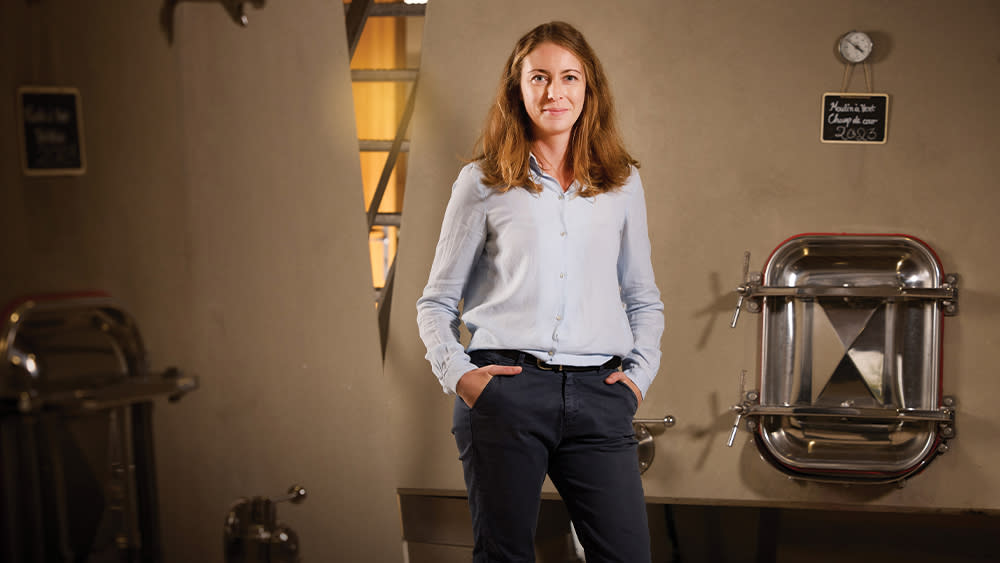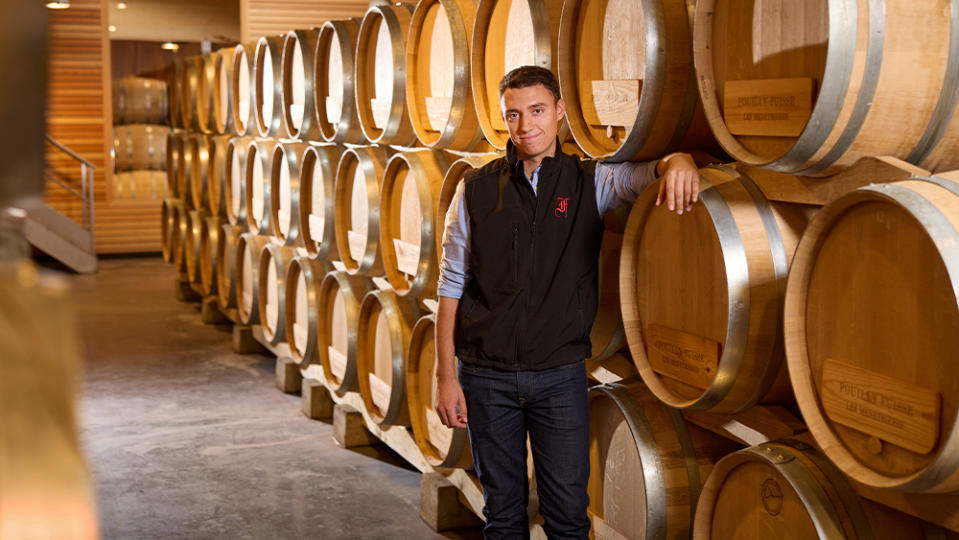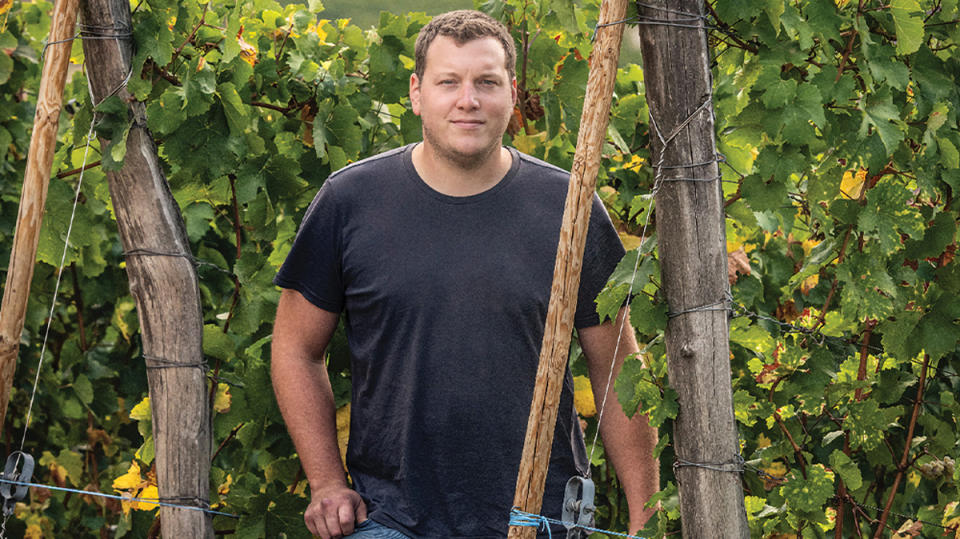Young Vintners Are Making Serious Wine. Now They Have to Convince Their Generation to Drink It.

This story is from an installment of The Oeno Files, our weekly insider newsletter to the world of fine wine. Sign up here.
Julie Pitoiset, the 33-year-old winemaker at historic Beaujolais producer Château des Jacques, knows her generation is drinking less of the beverage to which she’s devoted her career. Like at many estates around the world, the dip in demand is a topic of conversation at the château between her and her colleagues, she tells us. And yet, Pitoiset and her team noticed something promising: Groups of younger wine drinkers were among the most engaged visitors at the winery. Perhaps the cohort just needed a little more nudging and support. So they developed tours specifically with young people in mind, promoted the sessions directly to the these elusive generations, and made booking easier by offering it through their phones.
More from Robb Report
“These visits are different for us because we have to go over the basics, for example the tasting stages,” Pitoiset says. Yet she has found the program gratifying, because Pitoiset enjoys making a centuries-old château accessible and believes producers are pivotal to educating people about wine. She’s part of a group of young winemakers we’ve spoken to who are working to ensure their generations will enjoy wine like their parents and grandparents did before them.
It will be an uphill climb for them. The entire wine industry appears to be at a crossroads, with recent research showing a decline in consumption. A decade ago, wine was the favored alcoholic beverage of 35 percent of Americans who drank, but last summer that number fell to 29 percent, according to a recent Gallup poll. Alcohol in general is less popular with people under 35, with the share of imbibers in the age group dropping to 62 percent from 72 percent 10 years prior.

The wine industry’s headaches are further compounded with fresh competition like hard seltzers, canned cocktails, and cannabis-infused beverages. That has left wine lagging in some very important metrics for young drinkers, according to a 90-page report published last October that offered an in-depth analysis of Millennial and Gen-Z consumption habits. Of the 1,300 people surveyed, roughly three-quarters felt wine wasn’t a good value, and many responded wine didn’t deliver on the flavor front.
These findings ring true for Clément Robinet, the 28-year-old director and winemaker at Domaine J.A. Ferret in Burgundy. “As a winemaker, many of my friends love wine, too,” he tells Robb Report, but he knows that many others in his age group consume mostly beer or cocktails. So to get young drinkers, the domaine is trying to be smart about where it makes its wines available. “As a small winery, we adapt distribution according to the style of our wines,” Robinet says. “Our entry-level wines that are more ‘immediate’ and easier to drink will be distributed in wine bars or bistros where consumers are usually younger rather than gastronomic restaurants.”
According to the World Economic Forum, Gen Z cares more about sustainability than previous generations, and Robinet believes that this applies to wine as well. “The methods of production are extremely important for the young generation,” he says. “They have more interest in wines that are environmentally friendly with an organic or biodynamic certification.” Pierre-Emile Humbrecht, who is 30 years old, oversees winemaking at Domaine Zind Humbrecht in Alsace; his family has been growing grapes here since 1620 and his grandparents established the winery in 1959. Speaking of his own wine drinking preferences, sustainability is key. “When I go to a wine shop to buy wine, it is important for me that the domain, château, or winemaker does organic or biodynamic production,” he tells us. Pitoiset echoes this sentiment, “Young consumers are also sensitive to the estate’s environmental commitment and its sustainable and respectful practices,” she says. Fortunately for the wine world, many producers have been embracing sustainability for years and are sure to win points with eco-conscious young drinkers.

Like Pitoiset, Humbrecht believes education is important. While he is aware that many younger drinkers enjoy beer, spirits, and cocktails, he holds tastings at universities that have wine clubs to introduce students to his family’s grand cru Riesling, Pinot Gris, and Gewürztraminer. Humbrecht says he also sees the adult children of his family’s customers coming to the winery for tastings and transitioning into the next generation of clients. Robinet agrees that teaching younger drinkers about wine is a priority.“With a good wine education, young people could understand and enjoy different kind of wines,” he tells us.
Humbrecht uses opportunities at fairs and large tastings to connect with consumers, and while he knows that social media helps to get the word out, he thinks this is just the first step in making a connection. Besides relating to a brand, opening a bottle of wine also helps to link us to the moment and to one another. A word that we hear thrown around a lot regarding younger consumers is authenticity; it is said that they are seeking brands with a true story that are helmed by real people, not mass-produced beverages from a faceless corporation. “I am looking for an emotion, something I enjoy from the first drop to the end of the tasting,” Pitoiset says. “It is intimately linked to the moment of tasting and the people around you.”
Want more exclusive wine stories delivered to your inbox every Wednesday? Subscribe to our wine newsletter The Oeno Files today!
Best of Robb Report
Why a Heritage Turkey Is the Best Thanksgiving Bird—and How to Get One
The 10 Best Wines to Pair With Steak, From Cabernet to Malbec
Sign up for Robb Report's Newsletter. For the latest news, follow us on Facebook, Twitter, and Instagram.

